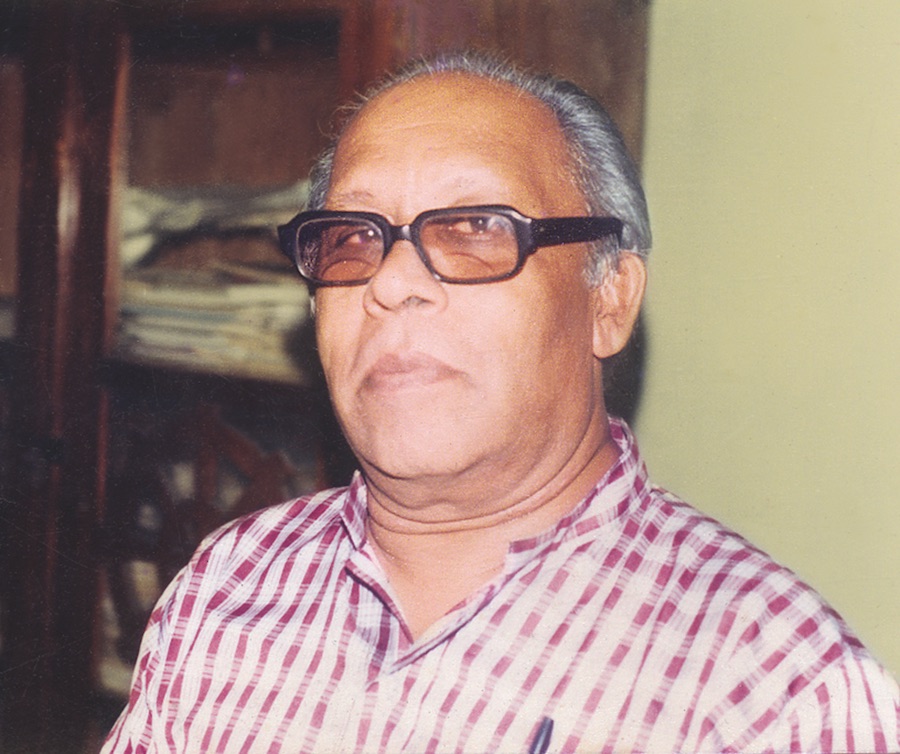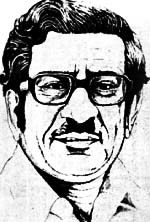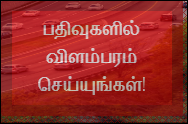 “Some might say that if a Sinhala man marries a Tamil woman or a Tamil man marries a Sinhala woman, then national unity will be born. I don’t think so. If people of different ethnic origin get married, only the children would be born as a natural consequence” quipped Ven. M Ratnavansa Thero- a Buddhist monk much loved and respected by Tamil writers and community members alike.
“Some might say that if a Sinhala man marries a Tamil woman or a Tamil man marries a Sinhala woman, then national unity will be born. I don’t think so. If people of different ethnic origin get married, only the children would be born as a natural consequence” quipped Ven. M Ratnavansa Thero- a Buddhist monk much loved and respected by Tamil writers and community members alike.
Late K.G. Amaradasa is someone of similar calibre who also held the strong belief that national unity is not a one -way street. He is a remarkable man who learned and excelled in the Tamil literature and who pioneered the way in introducing the great Tamil national poet Mahakavi Barathiyar to the Sinhala people.
Due to the introduction of the controversial Sinhala Only legislation in 1950s and the promotion of Sinhala as a compulsory subject in the curriculum, a large number of Tamils who held government positions learned Sinhala and mastered that language. Many Tamil writers also proceeded to learn Sinhala literary forms and translated them in Tamil. Sinhala cinema and drama productions were also subject of Tamil literary critique. In contrast, there was little or no reciprocal engagement by Sinhala literary figures and community members with the Tamil language and its rich literature. K.G Amaradasa was one of the handful of Sinhala writers who deeply regretted this situation and recognized that it ought to change even as early as 1970s.
He was a man of resolution who acted on his preaching. He learned Tamil and was able to speak our language fluently. His Tamil pronunciation had the beauty a child ‘s utterances and he also had the dedication to constantly ask his Tamil friends for feedback so that he can improve his Tamil language command. The warmth and generosity of his character was something deeply endearing.
He made his entry into the literary world in 1957. Only gradually he grasped the bitter reality of the ethnic question unfolding at the time. He envisioned that preserving the millennium long Sinhala -Tamil relationships from the devastating political catastrophe is an utmost duty of each and every writer of that divisive era.
He embarked on translating many Tamil literary works and introduced them to the Sinhala readers through newspapers. As he commenced working at the Department of Cultural Affairs he became a friend of many Tamil literary figures and writers. It is said that “Friends are not born -they are created”. The strong friendship that flourished between K.G Amaradasa and many Tamil writers was a living proof of this.
The sudden death of Professor Kailasapathi devastated Amaradasa. He wrote a moving tribute for his friend in Tamil which he titled as “Ayubovan My Brother!”:
“Along the ranges of Himalayas -there lies the impenetrable peak of Kailash!
So have I read in many books.
Its beauty and majesty compete with each other, and there resides the omnipotent Lord Shiva!
So have I heard as well.
To date, I have not witnessed that splendid sight.
Beyond the point of Kumari, in our holy land
There also lived a Kailash -atop the Tamil literary Himalayas
For 49 blessed years!
It cast its light, burning bright and rid the literary world
Of the misery of darkness in every fold and made life anew!
Alas! That Kailash was felled by a lightening blow and I am grief -stricken!
I wonder whether Lord Shiva resented a mortal competitor to the repute of his majestic abode!
My dearest friend, why did you abandon us without any warning?
Wander where you wish, but do not tread on Himalayas -your place is here and here only!
May your soul live on and serve this blessed land of Sri Lanka.
Be born and re-born for thousands of years- here and here only!
So that art and literature can live on and chant your name endlessly!
Until we meet next time-Ayubovan my brother!” This deeply moving tribute to Professor Kailasapathi was published in the Tamil daily “Veerakesari” in 1982. Sadly, today, we also say farewell to KG.
This deeply moving tribute to Professor Kailasapathi was published in the Tamil daily “Veerakesari” in 1982. Sadly, today, we also say farewell to KG.
There is absolutely nothing wrong in our two ethnic groups learning each other’s language. Many of those, who were adamant that they would not learn Sinhala language had subsequently been forced to learn foreign languages such as French-Italian-Norwegian-Dutch and Danish due to the harsh reality of emigration.
It is said that Karl Marx knew and mastered 7 languages. No language has ever inflicted any wrong on another ethnic community. It is those extremists whose toxic presence blight every ethnic community, who had used language as a tool of oppression and had harmed their fellow human beings through their actions.
KG had the vision to understand that Sinhala extremism pushed Tamils to the point of separatism. However, he did not become an activist by openly expressing his views and condemning such developments. Rather, he defined himself as a writer/literary figure whose pursuit of national unity and reconciliation was confined to that framework only. But ultimately, he remained a true humanist.
Whenever I met him in Colombo, we would exchange our views and passionate thoughts on ethnic issues. I happily bore the responsibility of critiquing many of his translated works. He introduced me to many Sinhala writers and journalists who broadened my perspectives.
“When the issue of inflation cripples the nation, frequently shooting up the price of basic necessities such as plain flour-bread-rice-sugar- fuel-cigarette and liquor, the State treats everyone on par. But when it takes key decisions concerning education-job opportunities-government job promotion etc, the State crudely plays the ethnic card and discriminates against people on ground of their ethnicity” a frustrated KG would comment!
Once, he learned that a son of his Tamil literary friend from Jaffna was injured during a shell attack. He was sleepless and was so distraught about the suffering of his friend. His own family had no idea as to the identity of this friend. His son Abaya Amaradasa shared this information with us during KG’s funeral which was held in Dehiwela. I subsequently mentioned this in my tribute for KG which was published in “Veerakesari”. Even at that point, I was not aware of the identity of this specific Tamil friend of KG.
Few weeks later, one of my literary friends- N.K Ragunathan met me in a distressed state and asked for KG’s home address. Only then I realized that it was Ragunathan’s son who was injured during that shell attack. Ragunathan also visited KG’s house and paid his condolences to his family. KG had translated some of Ragunathan’s literary works as well. He earned the enduring friendships of many Tamil writers through his tireless service.
That was an unforgettable day -Amaradasa’s body was laid in his home and a large crowd had gathered to pay its last respects. Along with friends Premji, Manikkavasakar, Thelivathai Joseph, Ranganathan and Raja Srikanthan, I also paid my last respects to him and came outside. Many chairs were lined up to accommodate the visitors. We were all seated in silence. There was a small table set up with newspapers to occupy us. Among the English, Sinhala language dailies, I also spotted “Veerakesari”,“Thinakaran” and “Thinapathi”. I was amazed beyond words. I shared my astonishment with KG’s son. “Father buys all the newspapers. He would read them regularly. He would share any useful information with us. He would also urge us to read Tamil” he responded.
How many of us would be true trilingual readers like KG?
There is a long raging controversy accusing Mahakavi Barathiyar of ignorance and lack of vision about the Sri Lankan history for his poetic statement “let us build a bridge to the island of Sinhala”. Those who debate about this statement and even denounce Barathiyar for his supposed narrow -minded nationalism forget an important fact.
The great poet Barathiyar is not someone confined to the Tamil literary world alone. He is someone whose thoughts transcended beyond narrow ethnic and national divides. He is an internationalist in his philosophy and reach.
Barathiyar had inspired the Sinhala community in its pursuit of independence as well. Therefore, KG was keen to introduce him to the modern Sinhala readers. His desire was fulfilled during the centenary of the Mahakavi.
KG translated the book “Mahakavi Barathi”-written by our friend S.L.M. Hanifa. It was published by the Kandi -Kalhinnai Tamil Society. Another notable work was “Barathi Pathya”. In it, he translated number of prominent Barathiyar songs including “Wake up song for Mother India”; “Our Country”; “Prayer for Goddess of Independence”; “Thirst for Independence”; “Indian Society “; “Song of Independence”; “The Departing India and Emerging India”; “New Russia”; “Liberation”.
This remarkable book was published during the Barathiyar Centenary celebrations by the Sri Lankan Progressive Writers Society. It also contained few other Barathiyar songs translated by Ratna Nanayakkara (who had worked in the Sri Lankan Movie Corporation).
KG was the key person who introduced Dominic Jeeva-Editor of “Malligai” to the Sinhala readership. Though some of Jeeva’s short stories had already been translated in Sinhala by some other Sinhala writers (including Gunasena Vithana), it was KG who facilitated the publication of Jeeva’s critical interview in the popular Sinhala daily “Divayina”.
During 1980, KG contacted me by telephone and confirmed the details of Jeeva’s travel plan to Colombo. He then organised the meeting between Jeeva and a journalist from “Divayina” which took place in Art Gallery ( Kalabavanam), Colombo. Both KG and myself translated the questions posed by the interviewer and Jeeva’s responses. That interview was duly published in “Divayina” much to the critical acclaim of the readers and fellow journalists.
In particular, the interview highlighted the apposite statement by Jeeva that “Sinhala readers are largely ignorant of Tamil literary works and Tamil literary thinking in contrast to the significant level of engagement by Tamil readers in the Sinhala literary works. Regrettably, the Tamil names that Sinhala readers are most familiar with are Amirthalingam and Kuttimani only”.
Many Sinhala readers and Sinhala politicians took note of both Jeeva and “Malligai” after the publication of this popular statement. Among them, some of the most noteworthy were the elder daughter of Martin Vikramasingha (the renowned Sinhala literary figure) and Mr Sarath Amunugama (who had served as both a Government Minister as well as Secretary of the Ministry). I have met them on other occasions on behalf of “Malligai”. KG had introduced me to them along with many other remarkable Sinhala author and literary figures.
During the period he served as the Secretary of the Department of Cultural Affairs (1976), the National Sahitya Award Ceremony took place at the Bathalagethara Teaching Institute, Athanagala. The prestigious awards were given out to Tamil-Sinhala writers by Hon William Koppallawa (the first President of Sri Lanka). Under the Tamil literary award category, writers Shanthan, Sengai Aliyan, Athmajothi Muthaiah, Thamilaruvi Sanmugasuntharam (former Principal of Mahajana College) and myself were meant to be honoured with certificates and prize money. Apart from Sengai Aliyan (Dr.K.Kunarasa), all four of us attended the ceremony. Intriguingly, we were only handed with cheques on the day!
KG -who was the serving Departmental Secretary, took us apart and profusely apologized to us for not being able to get the certificates printed in Tamil. “It is unacceptable that we could not print the certificates in Tamil and therefore I could not bring myself to give out those certificates to you all today” he reiterated.
Many months later, I collected my certificate from his office in person. I still preserve that precious document which carried his translation and hand -written signature in Tamil! Indeed, during those times of dire lack of Tamil translators and Tamil typists in the Department of Cultural Affairs, KG had carried out those duties himself!
Today, adoption of bilingual policy is widely advocated in the post-war Sri Lanka. On a personal level, by religiously adopting that policy and rigorously upholding standards of utmost human dignity, KG had stood out and provided exceptional leadership for generations to follow.
K.G Amaradasa was an exemplary man of deep, peaceful nature. He read widely and reflected intensely. He reached out to all with genuine love and generosity. He was deeply loved and respected by us all.
I was only able to find minimal references to him and his works (it referred to my previous essay on KG which was published in the book “Nejil Nilaitha Nenjangal- “Hearts etched in my heart”).
இந்த மின்-அஞ்சல் முகவரி spambots இடமிருந்து பாதுகாக்கப்படுகிறது. இதைப் பார்ப்பதற்குத் தாங்கள் JavaScript-ஐ இயலுமைப்படுத்த வேண்டும்.

